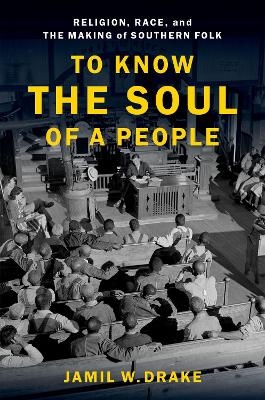
To Know the Soul of a People
Oxford University Press Inc (Verlag)
978-0-19-008269-7 (ISBN)
To Know the Soul of a People is a history of religion and race in the agricultural South before the Civil Rights era. Jamil W. Drake chronicles a cadre of social scientists who studied the living conditions of black rural communities, revealing the abject poverty of the Jim Crow south. These university-affiliated social scientists documented shotgun houses, unsanitary privies and contaminated water, scaly hands, enlarged stomachs, and malnourished bodies. However, they also turned their attention to the spiritual possessions, chanted sermons, ecstatic singing, conjuration, dreams and visions, fortune-telling, taboos, and other religious cultures of these communities. These scholars aimed to illuminate the impoverished conditions of their subjects for philanthropic and governmental organizations, as well as the broader American public, in the first half of the 20th century, especially during the Great Depression. Religion was integral to their efforts to chart the long economic depression across the South.
From 1924 to 1941, Charles Johnson, Guy Johnson, Allison Davis, Lewis Jones, and other social scientists framed the religious and cultural practices of the black communities as “folk” practices, aiming to reform them and the broader South. Drawing on their correspondence, fieldnotes, and monographs, Drake shows that social scientists' use of “folk” reveals the religion was an important site for highlighting the supposed mental, moral, and cultural deficits of America's so-called folk population. Moreover, these social scientists did not just pioneer rural social science and reform but used their study of religion to plant the seeds of the concept that would become known as the “culture of poverty” in the latter half of the twentieth century. To Know the Soul of a People is an exciting intellectual history that invites us to explore the knowledge that animated the earnest yet shortsighted liberal efforts to reform black and impoverished communities.
Jamil W. Drake is Assistant Professor of Religion at Florida State University. He teaches and researches in the area of American Religious History, with a specific concentration in African-American religion and politics. His work explores the relationship between race, science, and state governance.
Preface: The Legacy of Hampton: Folk, Religion, and Classifying the Cabin People
Introduction
Chapter 1: Moralizing the Folk: The Negro Problem, Racial Heredity, and Religion in the Progressive Era
Chapter 2: Assimilating the Folk: White Southern Liberals, Revival Religion, and Regional Isolation
Chapter 3: Medicalizing the Folk: Superstitions, Family, and Germs in the Venereal Disease Control Program
Chapter 4: Saving the Folk: Cultural Lag and the Southern Roots of the Religion of Poverty
Chapter 5: Preserving the Folk: Folk Songs and the Irony of Romanticism
Conclusion: The Aftermath of the Religion of Southern Folk
Bibliography
Index
| Erscheinungsdatum | 10.01.2022 |
|---|---|
| Verlagsort | New York |
| Sprache | englisch |
| Maße | 142 x 209 mm |
| Gewicht | 340 g |
| Themenwelt | Geisteswissenschaften ► Geschichte ► Regional- / Ländergeschichte |
| Geschichte ► Teilgebiete der Geschichte ► Religionsgeschichte | |
| Religion / Theologie ► Christentum ► Kirchengeschichte | |
| Sozialwissenschaften ► Ethnologie | |
| Sozialwissenschaften ► Soziologie | |
| ISBN-10 | 0-19-008269-0 / 0190082690 |
| ISBN-13 | 978-0-19-008269-7 / 9780190082697 |
| Zustand | Neuware |
| Informationen gemäß Produktsicherheitsverordnung (GPSR) | |
| Haben Sie eine Frage zum Produkt? |
aus dem Bereich


